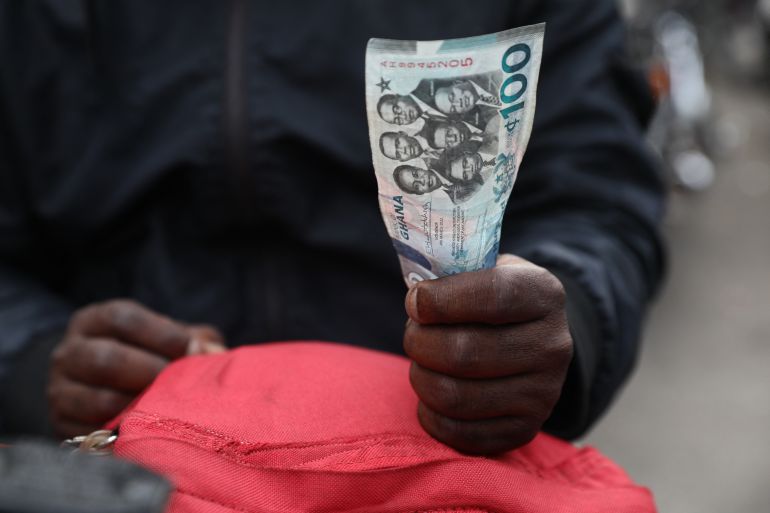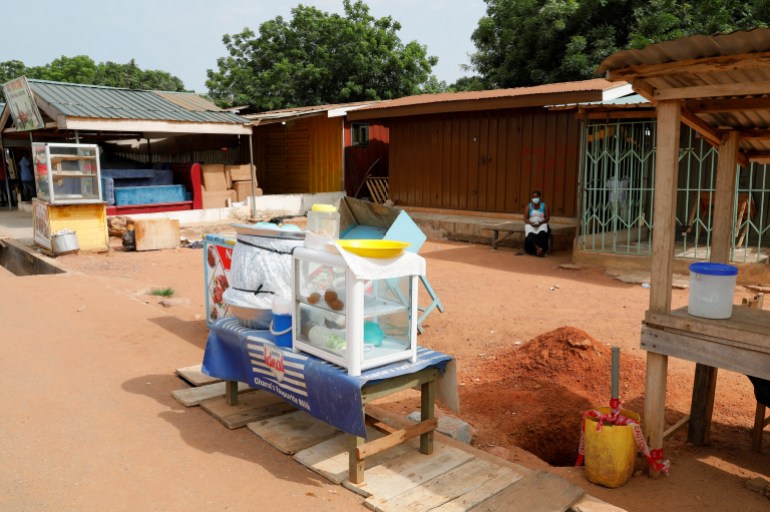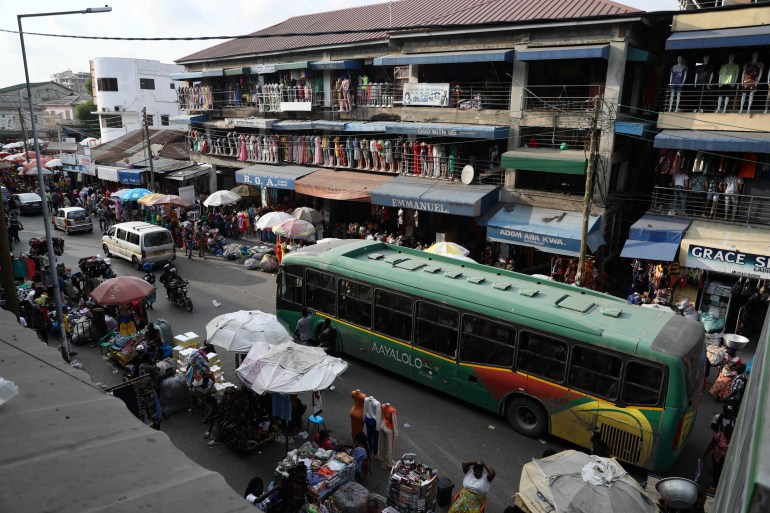Lack of safety nets hurt Ghana’s most vulnerable as economic woes deepen
Ghana’s low-income households and working class are feeling the effects of the country’s worst economic crisis in decades.

Accra, Ghana – Until last year, “Kofi Brokeman”, a streetside snack of roasted plantains and peanuts, was an everyday treat for many of Ghana’s 33 million people. Then prices began rising, almost doubling in some places to 5 Ghanaian cedis ($0.43 cents) per slice. So some locals jokingly rechristened it “Kofi Richman”.
But the situation is no laughing matter for Lovelace Ayittey, 59, who sells the snack on Lagos Avenue, a stretch in the wealthy East Legon enclave of Accra.
Keep reading
list of 4 itemsThe legendary flavoured ground salt from India: Pisyu loon
Nearly 55 million face hunger in West and Central Africa, UN warns
Revisiting molokhia amid war and displacement in Gaza
“The price of the plantain bunches has risen sharply from 10 to 50 cedis,” she told Al Jazeera. “I cut them the same size but I have to squeeze my hand and suffer the loss.” Last week, Ayittey said she had to toss out 800 cedis ($69) worth of plantains that went unsold.
As the West African nation endures a spiralling economic crisis, the cost of living is skyrocketing.
For years, Ghana positioned itself as a stable economy and land of opportunity for all. Since 2019, it has also marketed itself as a home for Africans in the diaspora, targeting them with a campaign of pan-African fellowship and festivity, whose end-of-year highlights locals now call “Detty December”.
But the data says otherwise.
A World Bank report last June revealed that 850,000 Ghanaians had been pushed into poverty, joining the six million already in that category. Between January and December 2022, year on year inflation rose from 14 to 54 percent, reaching levels unseen since the early 2000s. The currency, the cedi, has lost more than half its value against the dollar.
Many low-income households now spend more than half of their earnings on food. In trotros, the vans that serve as a popular means of transportation, passengers and drivers’ mates now fight over the sudden jump in fares.
The Kenkey Index, a project tracking the change in price and size of kenkey (dumplings), a carbohydrate-heavy go-to staple, found that the prices were increasing as the sizes got smaller. The most common price now is 4 cedis ($0.34), up from 3 cedis (0.26) a year ago.
So Comfort Asamoah, who has sold toothpaste, toilet rolls and other toiletries for the last 30 years from a pavement on the margins of the Tema Station market in Accra, can longer afford to eat kenkey and fish.
Instead, she now eats one meal of banku (boiled dough) and soup daily. “I have to mentally persuade myself that I am satisfied [with my food choice],” she said. “Yes, there was some food distribution from the government,” she said “but the cost of transportation to get there compared to how much you got wasn’t worth it.”
Asamoah is grateful for the government’s free senior high school programme, which has cut her costs for her children’s education. But still, she’d needed about 4,000 cedis ($345) for supplies and pocket money for her two daughters. The COVID-19 era hardship depleted her savings so she has had to make one daughter stay home.
Last May, President Nana Akufo-Addo’s administration asked the International Monetary Fund to get a loan – for the 17th time in the country’s history.

No safety nets
Dorcas Ansah, Accra coordinator of the nonprofit WIEGO (Women in Informal Employment: Globalizing and Organizing) believes more people have been driven into poverty than have been accounted for.
WIEGO works with domestic workers, market traders, street vendors and others in informal jobs who make up half of all employees in the Greater Accra area.
Informal employment accounts for 89 percent of employment nationally, as well. But these workers are generally not covered by pensions, don’t receive cash transfers, and are not beneficiaries of poverty relief programmes. “Informal workers are also essential workers,” Ansah said, “During COVID-19, markets across the country had to be open, and their workers placed at risk.” Despite that, they received little support.
In 2021, a WIEGO study found that only five percent of workers had received food relief from the government. More than half of workers generally reported skipping a meal or eating a smaller variety of foods.
The government says the COVID-19 pandemic and the war in Ukraine – which has driven up some food, fertiliser and fuel prices – were the primary causes of the economic woes. Yet the World Bank’s report highlighted that the economy “entered a full-blown crisis in 2022, after having rebounded from the COVID-19 slowdown in 2021”. The authorities, the report noted, “failed to implement significant and sustainable reforms that would have been required to restore debt and fiscal sustainability”.
Most Ghanaians have attributed the crisis to government corruption.
According to Afrobarometer surveys, 83 percent of people believed there was a theft of pandemic-related funds. They point to the auditor-general’s report revealing that $80m was spent on vaccines that never arrived and to officials at the Ministry of Information who paid themselves unapproved risk allowances, as corroboration.
The World Bank, too, in its report, noted that the government was “unable to enforce large across-the-board expenditure cuts”.
All of this occurred concurrently with underinvestment in helping the poor to withstand economic shocks. Ghana’s expenditure on debt servicing is four times what it spends on education, eight times more than health spending, and 14 times more than funding for social protections.
After visiting in 2018, Philip Alston, the UN’s Special Rapporteur on extreme poverty noted that Ghana was investing only 1.4 percent of gross domestic product in social protections, compared with its peers in the region who spent 50 percent more. Alston said existing programmes were “likely to benefit the … well-connected far more than those living in poverty”.
For instance, since 2014, the government has spent less on the National Health Insurance Scheme programme than the funding allocated to it. In 2021,1.9 billion cedis ($164m) were allocated for it by the National Health Insurance Authority but only 1.39 billion ($120m) were released.
Ayittey, the “Kofi Brokeman” seller, visits the Korle Bu Teaching Hospital for diabetes treatment frequently. Despite having insurance, she told Al Jazeera that she spends 100 cedis ($8.60) on every visit. “The medicine is covered, but you get charged for the equipment used, labs and other services.”
Elderly people and those with disabilities told Alston that money received from another scheme, the Livelihood Empowerment Against Poverty (LEAP) – 64 cedis ($5.50) at the time, but increased to 128 cedis ($11) this year – only “covered them for at best two weeks out of an eight-week pay cycle”.

New priorities
The working and middle classes have been feeling the pinch, too. While there had been economic growth in the years leading up to the COVID-19 crisis, much of the gains had gone to the affluent so Ghana has one of the fastest-growing rates of inequality in Africa.
According to the Ghana Statistical Service, four of five public sector employees earn less than 3,000 Ghanaian cedis ($260) a month. An online survey (skewed towards college-educated single men under 35) conducted by financial analyst Jerome Kuseh also found that more than half of respondents made less than 5,000 cedis a month ($440). At least half of those surveyed had less than 10,000 cedis ($860) as their total life savings.
“Ghana’s safety net consists of an underfunded health insurance scheme, free senior high school education with disparities in the quality of infrastructure,” Kuseh told Al Jazeera.
“These social programmes are necessary, but are inadequate to tackle the recurrent economic crises that result in a sharp increase in the cost of living every few years.”
Analysts say the government has to change its course of action and enact policies favouring its most vulnerable citizens.
“For far too long, the interests of the wealthy few have defined, driven and directed public policy that could have addressed this,” Kwesi Obeng, accountable governance lead for Oxfam Africa told Al Jazeera. “Stemming the tide of austerity and addressing poverty should be top priority for the government.”